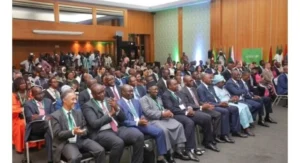In Lagos, political analysts are reopening the debate on Africa’s political economy and the leadership role Nigeria must play. The Guardian reported a bold statement by Julius Malemma, leader of South Africa’s Economic Freedom Fighters (EFF). Speaking at an MBA conference in Nigeria, he declared that Africa’s future rests on the political economy of Nigeria and South Africa. He called for a continental president, a single parliament, a unified currency, and a joint military. His remarks reignited long-standing discussions on African unity and the challenges of building a continental superstructure.
Malemma’s proposal favors centralization, a vision that contrasts with today’s global trend of decentralization. Analysts agree that centralization may offer political advantages, but Africa’s diversity makes it complicated. Unlike the United States of America, which unified under a shared Anglo-Saxon heritage, Africa is home to hundreds of groups, languages, and cultures. This vast diversity complicates the dream of a “United States of Africa,” even if political will exists.
The U.S. created cohesion by sidelining indigenous peoples and forging unity among settlers with shared backgrounds. Africa’s path diverges sharply. Colonial borders forced together nations with distinct aspirations. Experts argue that while Malemma’s ideas inspire, progress requires addressing historical, social, and institutional barriers that leaders cannot ignore.
Nigeria and South Africa stand at the core of Africa’s integration. Nigeria, with its massive population, oil-rich economy, and influence in technology and entertainment, wields continental weight. South Africa, with its advanced industry, financial systems, and role in regional institutions, complements Nigeria’s strengths. Analysts describe both countries as the “twin engines” of Africa’s economy. Without their leadership, integration risks becoming rhetoric rather than reality.
Meanwhile, other nations, Kenya, Egypt, and Morocco, are boosting their influence. They may fill any leadership vacuum left by Nigeria and South Africa. This competition underlines the urgency for Nigeria to define its continental role. Global powers are already intensifying their scramble for Africa’s markets and resources. The African Continental Free Trade Area (AfCFTA) shows potential to grow intra-African trade, but success depends on strong cooperation. Nigeria’s ratification and full participation remain critical to building a united trading bloc.
Supporters of Malemma’s ideas argue that stronger integration will protect Africa from exploitation. They believe that a single currency, a continental parliament, and unified defense systems would increase Africa’s power in global trade. They add that unity could attract more investment and create regional stability. Advocates stress that fragmented economic policies weaken growth, while collective action would reduce dependence on Western institutions.
Critics disagree. They warn that continental unity may be premature. Poverty, fragile democracies, corruption, and insecurity remain widespread. Conflicts in Sudan, the Sahel, and Central Africa show the instability that hinders unification. Analysts suggest that Africa should focus on stronger national economies, better infrastructure, and institutional reform before rushing into full political or military integration.
Also Read: Breaking News: ADC Emerges as Nigeria’s Third Force Amid Public Outcry Over Recycling of Politicians
In Nigeria, opinions remain divided. Some experts believe integration could spark industrialization, create millions of jobs, and enhance regional security. Others insist Nigeria must solve inflation, unemployment, and insecurity before taking the lead. They argue that the country should stabilize its own economy and governance before shaping continental policy.
Observers highlight foreign policy as a deciding factor. In the past, Nigeria invested heavily in peacekeeping and Pan-African diplomacy. Today, domestic crises have reduced its visibility on the continental stage. Analysts warn that Nigeria must balance reforms at home with engagement abroad. Aligning domestic stability with continental ambition will determine its leadership role.
The debate over Africa’s political economy remains pressing. The vision of a united Africa inspires leaders and citizens alike, but unity requires more than speeches. Nigeria and South Africa remain central in deciding whether Africa advances or remains divided. As forums, media, and policy circles push the conversation forward, one fact stands out: Africa’s global future depends on decisive leadership, especially from Nigeria.


